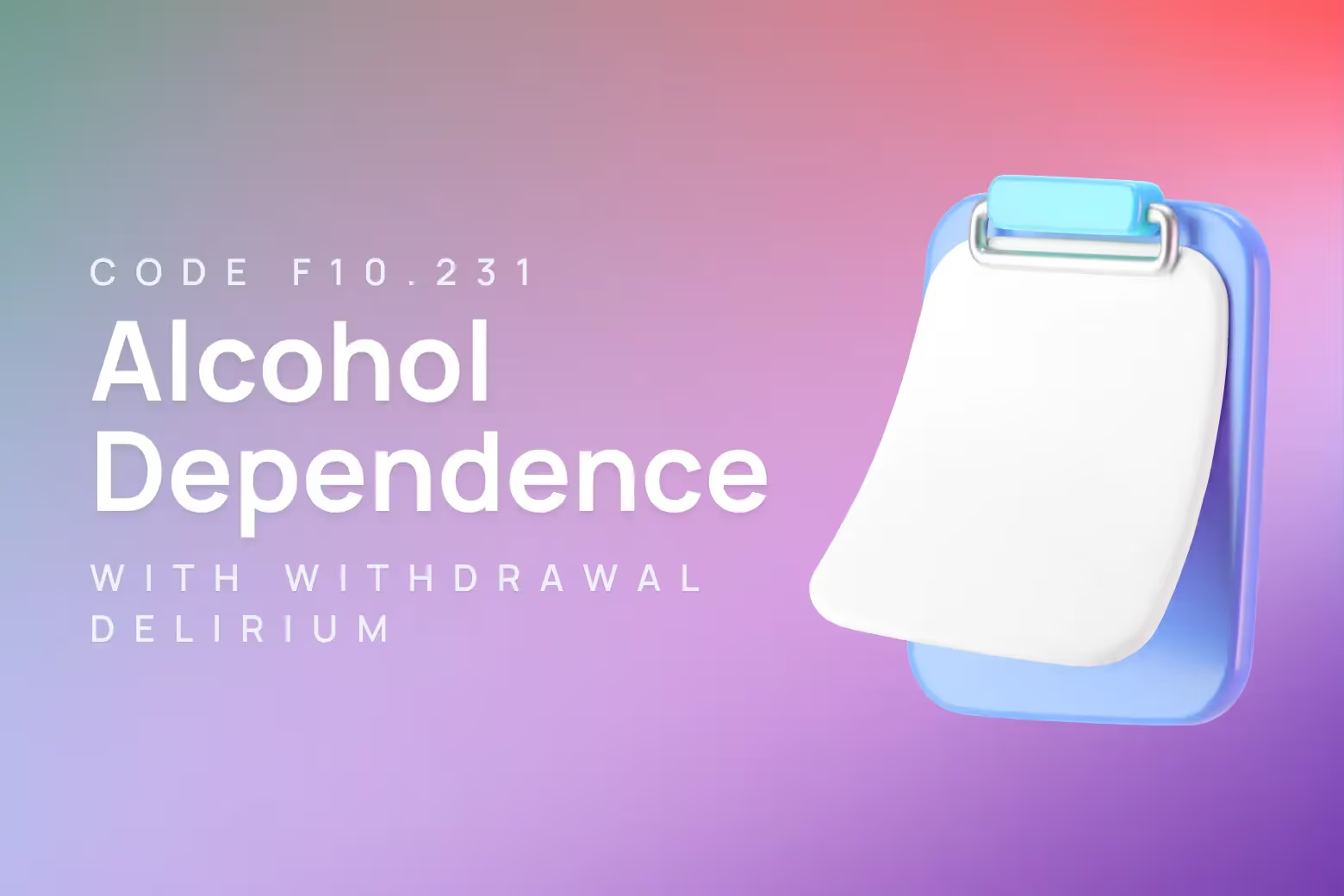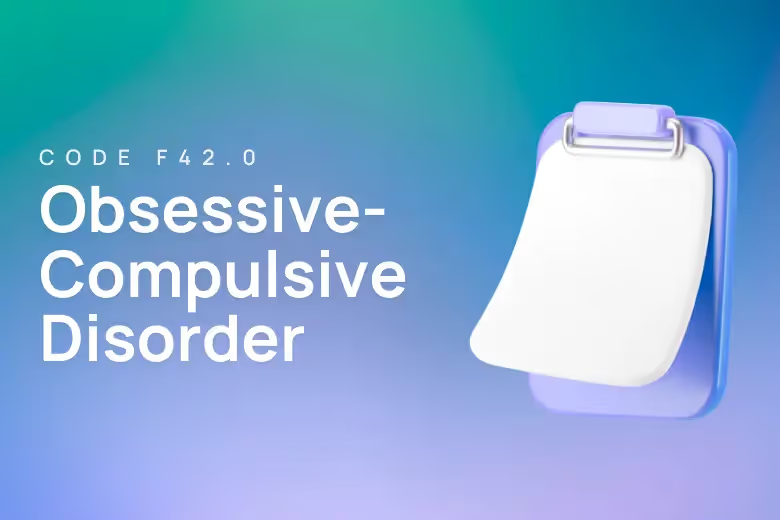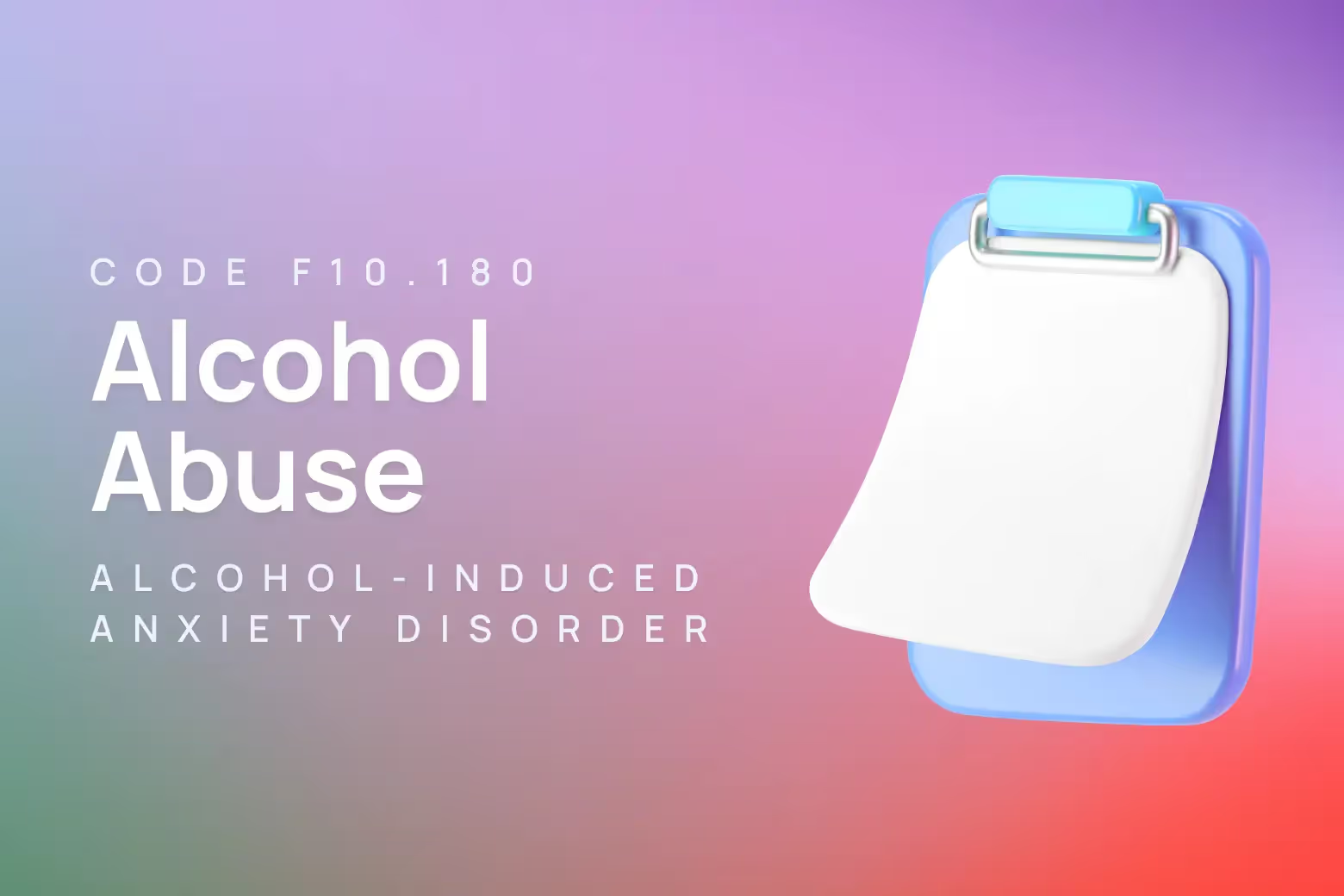ICD-10 code for alcohol dependence with withdrawal, delirium

F10.231 is the ICD-10 code for alcohol dependence with withdrawal, delirium.
This code identifies individuals who meet criteria for alcohol dependence and are experiencing delirium tremens, also known as alcohol withdrawal delirium.
Accurate diagnosis is critical as this condition requires immediate medical intervention and carries significant risks without proper treatment.
Key features:
- Medical emergency requiring immediate hospitalization and intensive monitoring
- Occurs in approximately 5% of individuals undergoing alcohol withdrawal
- Typically begins 2-3 days after cessation of drinking
- First-line treatment involves benzodiazepine loading with adjunctive antipsychotic medication

Diagnostic criteria for alcohol dependence with withdrawal, delirium (F10.231)
F10.231 requires the presence of both alcohol dependence and withdrawal delirium occurring simultaneously. The individual must first meet criteria for alcohol dependence, which involves a chronic pattern of alcohol use leading to clinically significant problems over at least 12 months.
Alcohol dependence criteria include:
- tolerance requiring increased amounts to achieve effects
- characteristic withdrawal symptoms when alcohol use is reduced
- unsuccessful efforts to control drinking patterns
Additional features involve:
- spending considerable time obtaining alcohol
- continuing use despite persistent physical or psychological problems
- giving up important activities due to alcohol consumption
The delirium component represents a severe complication characterized by disturbed consciousness and cognitive changes. Key diagnostic features include:
- Significant disturbance in attention and awareness with reduced environmental orientation
- Rapid onset developing over hours to days with fluctuating severity throughout each day
- Additional cognitive impairments affecting memory, language, or perceptual abilities
- Clear evidence that symptoms result directly from alcohol withdrawal rather than other medical conditions
When to use F10.231 diagnosis code
Proper differential diagnosis helps distinguish F10.231 from related conditions that may present with similar symptoms. This specific code applies when delirium occurs as a direct consequence of alcohol withdrawal in someone with established alcohol dependence.
F10.231 vs F10.230 (Alcohol dependence with withdrawal, uncomplicated)
The primary distinction lies in the presence or absence of delirium. Individuals with F10.230 experience alcohol withdrawal symptoms such as tremor, anxiety, nausea, and sleep disturbances without the cognitive and consciousness disturbances that characterize delirium. They maintain clear awareness of their environment and intact attention span.
F10.231 presents with profound alterations in consciousness, disorientation, and perceptual disturbances that fluctuate throughout the day. These individuals require intensive medical management due to the serious nature of delirium tremens.
F10.231 vs F10.232 (Alcohol dependence with withdrawal, with perceptual disturbance)
F10.232 involves hallucinations or other perceptual abnormalities during withdrawal while maintaining clear consciousness. Individuals experience vivid visual, auditory, or tactile hallucinations but remain oriented and aware of their surroundings.
In contrast, F10.231 involves global cognitive dysfunction with impaired attention, awareness, and orientation. The delirium represents a more severe medical emergency requiring different treatment approaches.
Related ICD-10 codes
- F10.23 Alcohol dependence with withdrawal
- F10.230 Alcohol dependence with withdrawal, uncomplicated
- F10.232 Alcohol dependence with withdrawal, with perceptual disturbance
- F10.239 Alcohol dependence with withdrawal, unspecified
Interventions and CPT codes for alcohol dependence with withdrawal, delirium
Medical stabilization and monitoring
Initial treatment focuses on controlling severe agitation and preventing life-threatening complications.
Medical teams work rapidly to achieve light sedation while monitoring vital signs, fluid balance, and neurological status. Environmental modifications include quiet rooms with minimal stimulation and adequate lighting to reduce disorientation.
Core medical intervention uses the following CPT codes:
- 99221-99223 Initial hospital consultation (based on complexity level)
- 99231-99233 Subsequent hospital care (daily management)
- 99291-99292 Critical care services when intensive monitoring is required
Benzodiazepine loading protocols
Evidence-based treatment involves aggressive benzodiazepine administration using loading dose regimens.
Providers typically administer diazepam in 20mg doses every two hours until achieving light sedation or reaching 60-80mg total dose. This approach prevents seizures and reduces mortality risk.
Medical management includes:
- 96365 Intravenous infusion for medication administration
- 96374 Therapeutic injection (intramuscular or intravenous push)
Antipsychotic adjunctive treatment
Second-line medications help control agitation when benzodiazepines alone prove insufficient. Common regimens include haloperidol, olanzapine, or risperidone administered alongside adequate benzodiazepine doses.
These medications never replace primary benzodiazepine treatment but serve as important adjuncts.
Nutritional and fluid management
Comprehensive care addresses dehydration, electrolyte imbalances, and thiamine deficiency commonly present in severe alcohol withdrawal.
Parenteral thiamine administration prevents Wernicke's encephalopathy, while magnesium replacement helps reduce neuromuscular hyperactivity.
Nutritional support uses:
- 96365-96367 IV fluid and electrolyte management
- 96375 Therapeutic injection for vitamin administration
(CPT codes alcohol abuse.txt, Guidelines for the Treatment of Alcohol Problems)
How Upheal improves F10.231 ICD-10 documentation
Suggesting appropriate ICD-10 codes based on session content
Clinical documentation platforms help behavioral health providers accurately identify withdrawal complications during assessment and treatment planning.
When clients present with confusion, disorientation, or severe agitation following alcohol cessation, artificial intelligence can flag potential delirium and suggest appropriate diagnostic codes.
This technology assists clinicians in recognizing the distinction between uncomplicated withdrawal and life-threatening delirium tremens.
Maintaining HIPAA-compliant records with proper diagnostic coding
Comprehensive record-keeping becomes essential when managing complex withdrawal presentations requiring multiple medical interventions.
Documentation platforms automatically track medication administration, vital sign monitoring, and clinical observations while ensuring all entries meet regulatory requirements.
This systematic approach helps healthcare teams maintain continuity of care across multiple providers and treatment settings.
Reducing administrative burden so you can focus on client care
Managing alcohol withdrawal delirium requires constant clinical attention and rapid decision-making.
By automating routine documentation tasks, providers can dedicate their full focus to critical patient monitoring and therapeutic interventions.
The platform captures essential clinical details while clinicians concentrate on life-saving medical management and family communication.
Supporting clients with alcohol dependence with withdrawal, delirium
Alcohol withdrawal delirium represents one of the most serious complications in addiction medicine, requiring immediate recognition and aggressive treatment.
The condition typically develops 48-72 hours after drinking cessation, though timing can vary significantly among individuals.
Early intervention dramatically improves outcomes, with modern treatment protocols reducing mortality rates from historical levels of 15% to less than 1%.
Successful management requires multidisciplinary coordination between emergency medicine, internal medicine, psychiatry, and nursing teams.
Family members need clear communication about the severity of the condition and expected recovery timeline.
Most individuals experience symptom resolution within several days of appropriate treatment, though some cases may persist for weeks.
Recovery planning begins during the acute phase, with addiction specialists developing comprehensive treatment strategies that address both the immediate medical emergency and long-term sobriety goals.
The experience of delirium tremens often serves as a powerful motivator for sustained recovery efforts, making the transition to formal addiction treatment programs particularly important.
Upheal’s clinical documentation platform helps behavioral health providers maintain detailed records of complex withdrawal presentations while focusing their attention on critical patient care needs.
By automatically capturing essential clinical observations and treatment responses, providers can ensure thorough documentation without compromising the intensive monitoring these clients require.
Start your free trial to experience how modern documentation tools support comprehensive addiction treatment.













